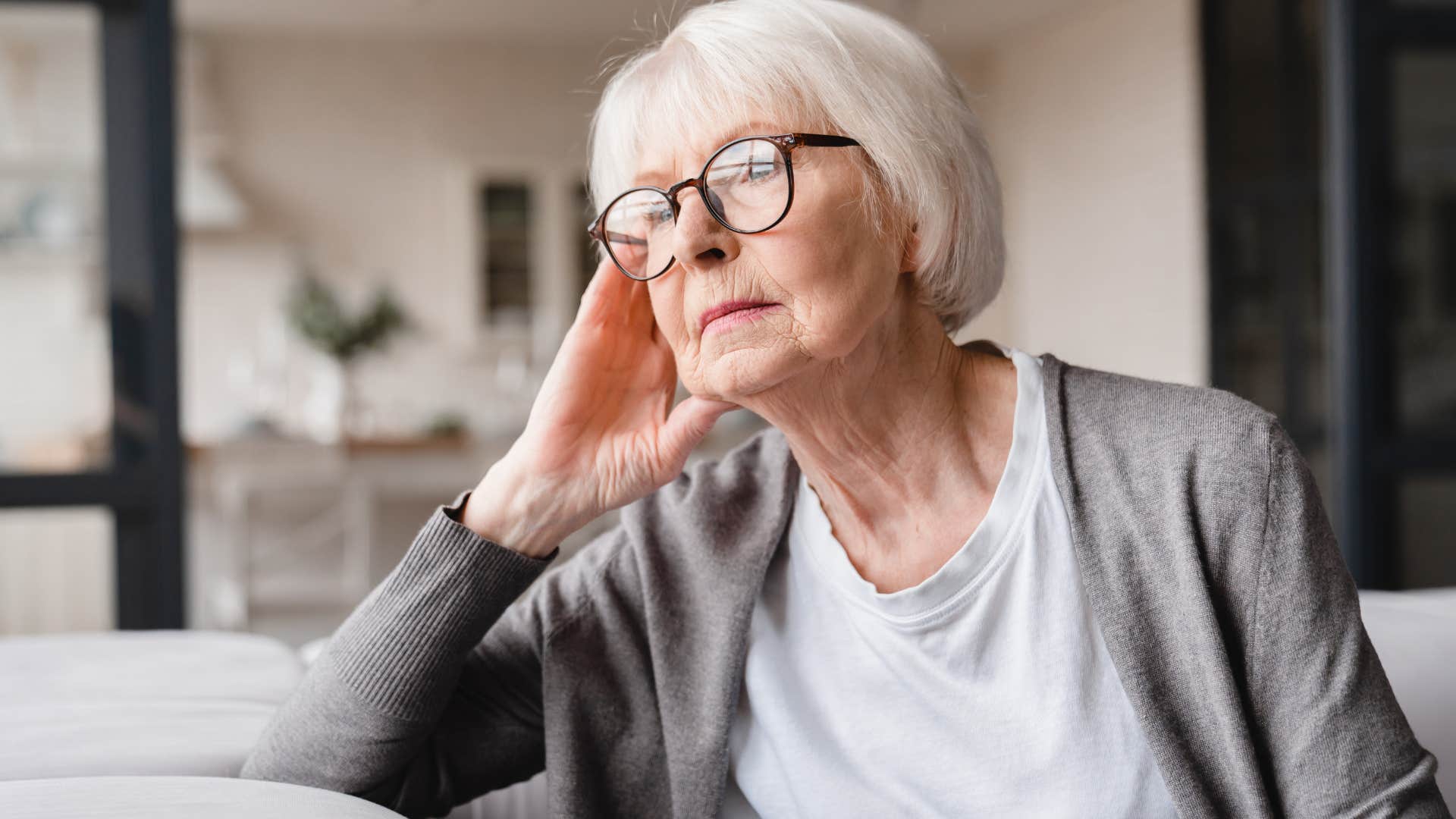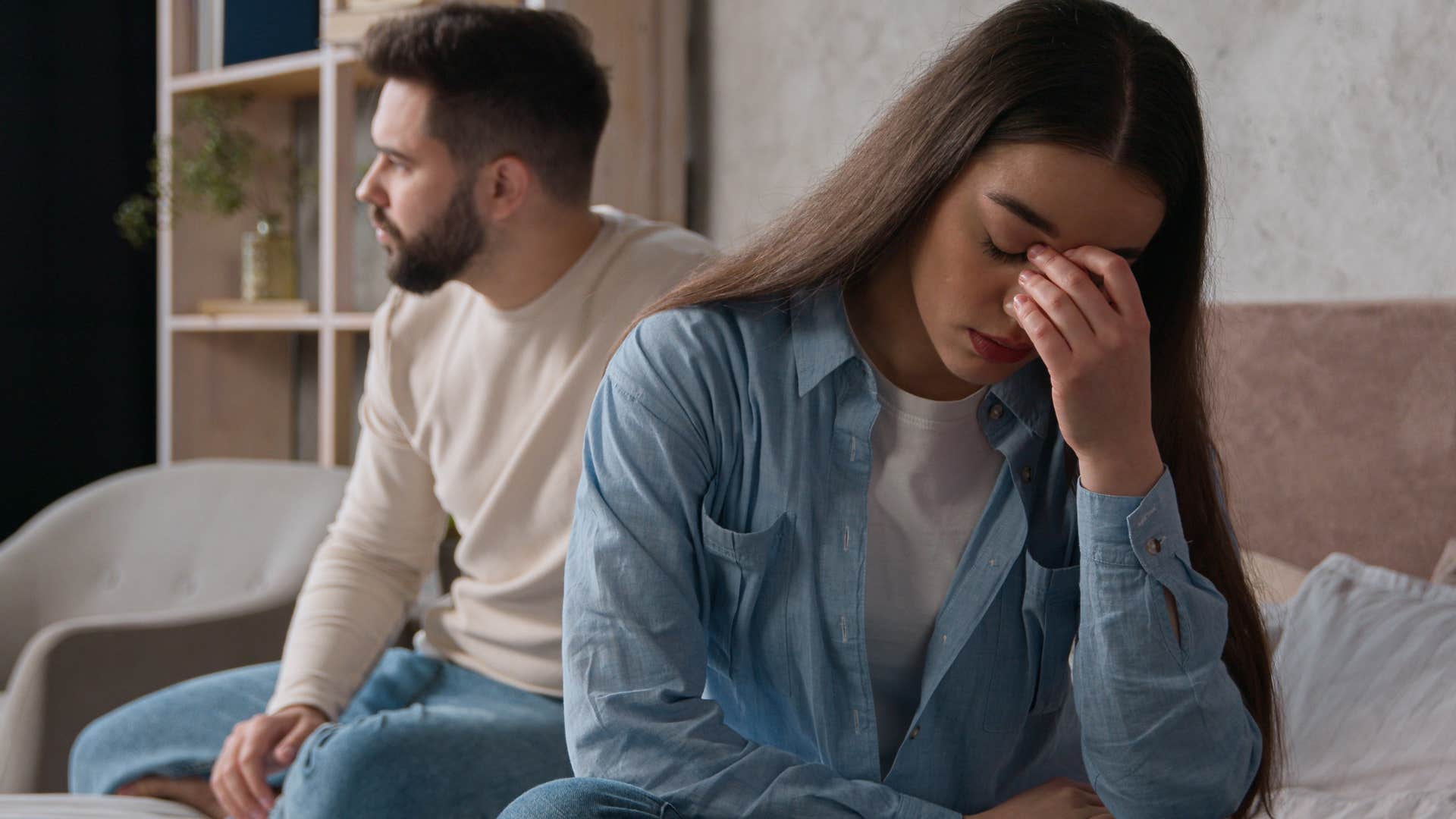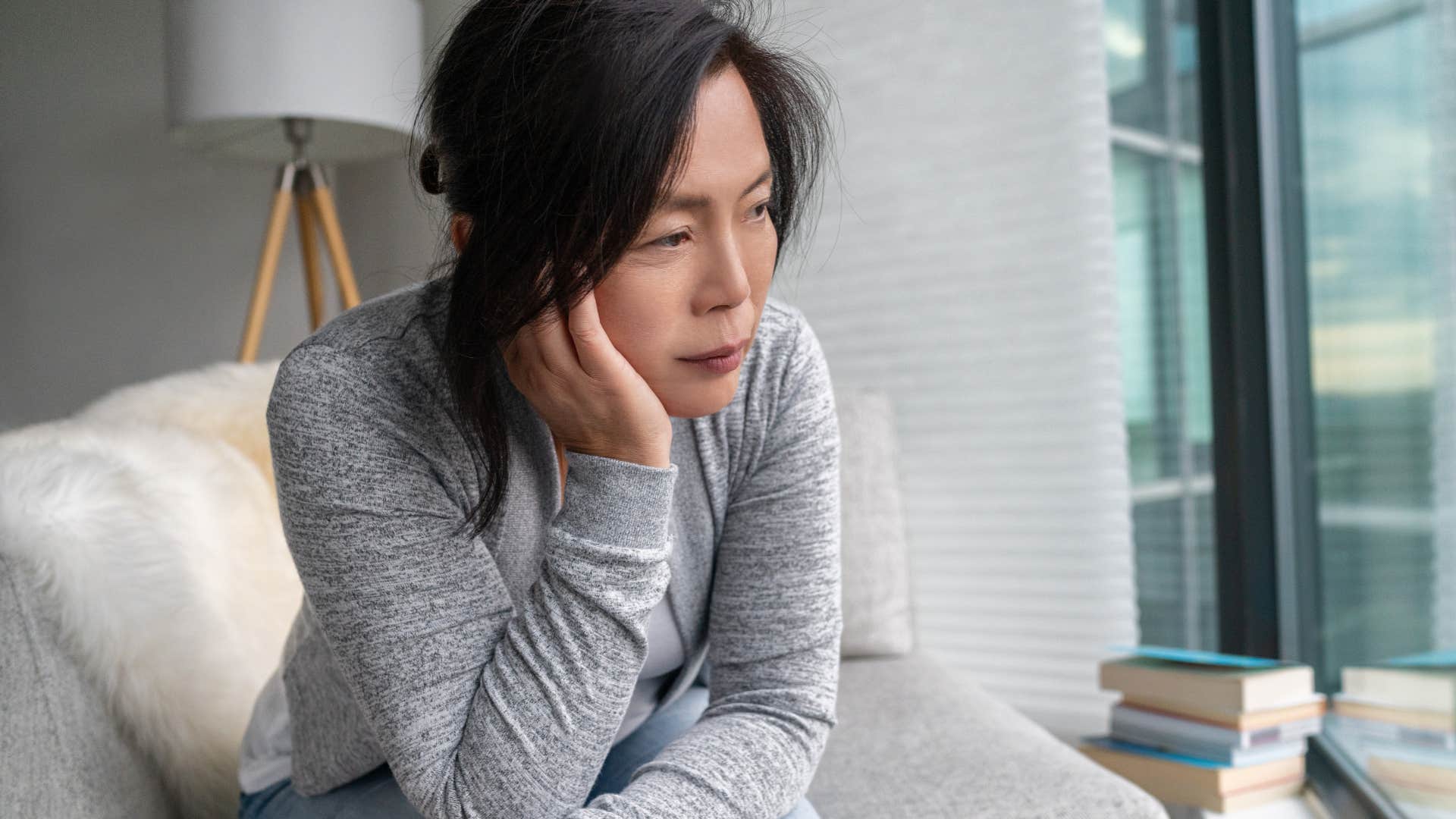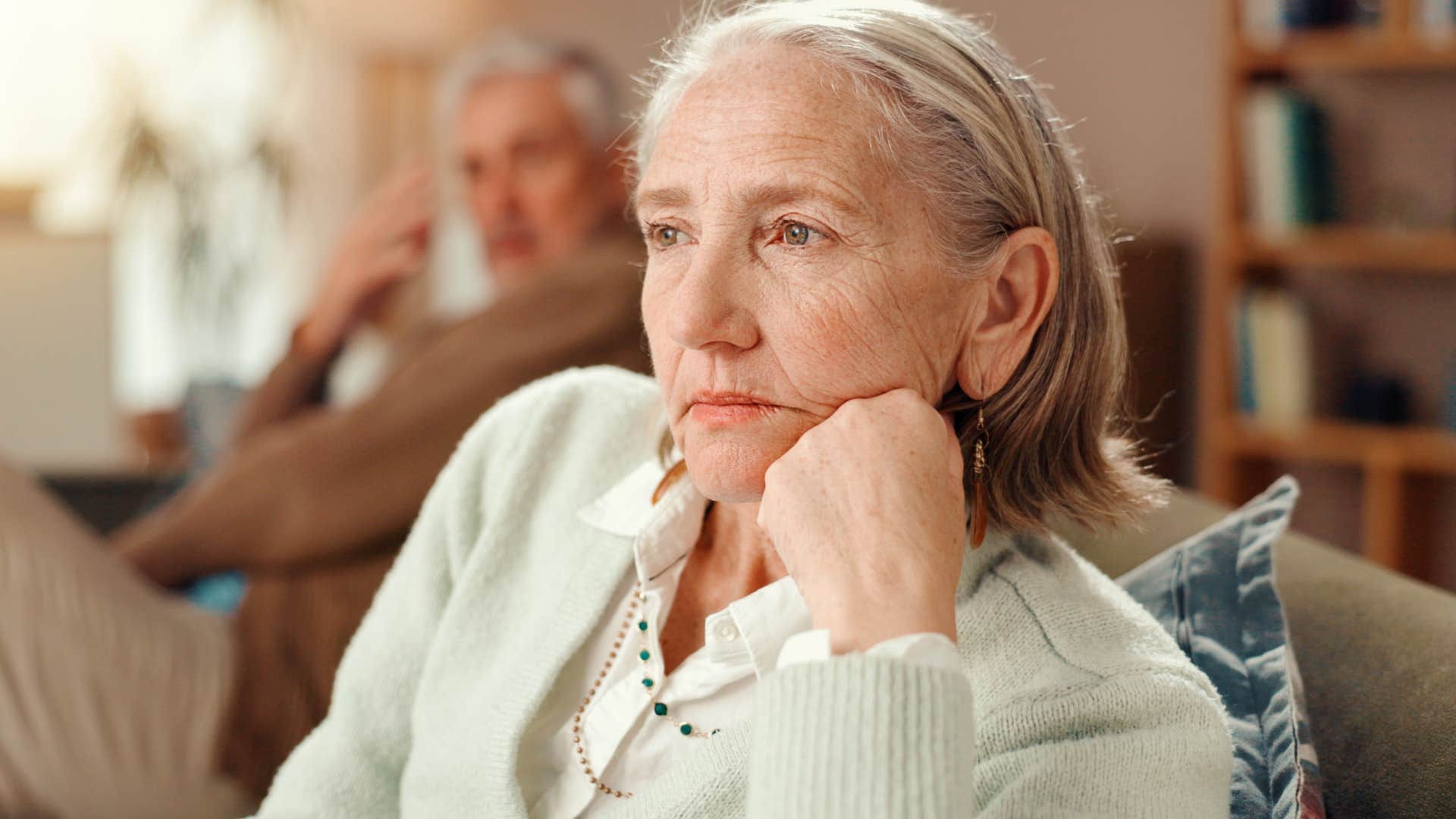Women Who Fall Out Of Love With Their Husbands As They Get Older Usually Have These 11 Reasons
They're sick of tolerating misbehavior and lacking respect.
 Goksi | Shutterstock
Goksi | Shutterstock There's a lot of nuance behind how women love — in their personal lives and beyond — especially as they get older, bolster their internal self-assuredness and self-esteem, and solidify their values. From needing a certain level of quality physical touch to taking on emotional labor, many of the same things that craft a healthy relationship are some of the same things that falter and harm their connections over time.
Women who fall out of love with their husbands as they get older usually have these reasons — even if they're unique to each situation and relationship, they typically evolve with age, experience, and internal security. Even if they've been taught to fit a certain standard or adopt certain traits — like people-pleasing, according to a study from the Journal of Experimental Psychology — as they get older, women who fall out of love pave their own individual paths forward.
Women who fall out of love with their husbands as they get older usually have these 11 reasons
1. They're tired of taking on emotional burdens
 Inside Creative House | Shutterstock
Inside Creative House | Shutterstock
Taking on emotional labor is a side effect of people-pleasing — a skill that many women are taught to take on in all of their relationships from a young age. Societal expectations to be agreeable and compliant manifest in these behaviors, teaching women to put their own needs on the back-burner, whether it's in their personal relationships, family dynamics, or workplace environments.
However, taking on these emotional burdens and never having the same level of support with a partner can feel exhausting and spark resentment that's hard to overcome. Especially after years of taking on the majority of this work — even in situations where they need help or support — it's not surprising that it's one of the reasons women fall out of love with their husbands.
2. Divisions of labor feel inequitable
 Tirachard Kumtanom | Shutterstock
Tirachard Kumtanom | Shutterstock
Outside of taking on emotional labor in their relationships — evolving their own emotions for the sake of others and facilitating emotional conversations and interactions for their male partners — many women feel exhausted by inequitable divisions of physical labor.
Whether that's taking care of children or doing household chores, women tend to take on the majority of these responsibilities, according to a study from Pew Research Center, despite working the same, if not more, than their male partners.
Women who fall out of love with their husbands as they get older usually have these reasons — they're tired of struggling with all of their responsibilities and never having the grace of support when they need it in the face of chronic stress, burnout, or emotional exhaustion.
3. They're tired of negativity
 MAYA LAB | Shutterstock
MAYA LAB | Shutterstock
Like a study from Frontiers of Psychology suggests, experiencing constant frustration in a relationship — whether it's not having needs met, having their independence and autonomy stifled, or not feeling heard — can experience a range of negative emotions from anger, to sadness, and even disappointment.
Even if these emotions seem subtle at the moment, not having a safe space or communication tools to acknowledge and heal from them can lead to resentment. Women who fall out of love with their husbands as they get older may be grappling with this resentment even more now than they were several years ago, growing tired of the constant burden of negativity and disconnection it's sparked.
Especially as their self-esteem grows and their general identity solidifies with age, women are more intentional about avoiding negative people and interactions that they no longer need, according to a study from Social Service Review. If their relationship is plagued by constant negativity — sabotaging health, rather than adding values to their lives — they're prone to falling out of love and possibly even walking away.
4. They've grown apart
 Perfect Wave | Shutterstock
Perfect Wave | Shutterstock
Whether it's a change in shared values and beliefs, differences in perspectives on the world, or a lack of shared interests in their relationships, women who fall out of love with their husbands may simply be grappling with disconnection and growing apart.
While it's obviously important for people to be different enough in their relationships to learn from each other, communicate, and bond, shared values and beliefs are important; in fact, a study from Nature Human Behaviour found that the majority of healthy couples share up to 89% of their values.
5. They don't feel supported
 Andrey_Popov | Shutterstock
Andrey_Popov | Shutterstock
Even on an emotional and personal level, women who don't feel supported by their partners may fall out of love. Even though there's nuance to their loss of feelings — rooted in more than just emotional and physical support — when women don't feel supported, they don't feel valued or heard.
Even though more than 60% of women argue they're more confident as they age, according to a OnePoll survey, oftentimes more so than when they entered into a relationship or marriage, it's still grounding to have a partner who consistently shows up and chooses them. However, they're also confident enough with age and life experience to walk away from someone who no longer supports them and show up with expectation.
6. There's been a betrayal
 Cast Of Thousands | Shutterstock
Cast Of Thousands | Shutterstock
Like a study from Frontiers in Psychology argues, trust is essential to building healthy and balanced relationships between couples. Not only does it create the foundation for healthy communication and conflict-resolution skills, it sets the stage for other important skills and behaviors like sharing affection, being emotionally vulnerable, and supporting each other unconditionally.
When there's been a case of infidelity or betrayal in a marriage, that trust isn't easily rebuilt with words or empty promises — it takes time and action to heal. However, women who fall out of love with their husbands may be tired of waiting for their partners to show up. If they were on the receiving end of this betrayal, falling out of love, having a solid reason to walk away, and leaning on their self-assuredness could prompt the end of their relationship.
7. They're having a midlife awakening
 PeopleImages.com - Yuri A | Shutterstock
PeopleImages.com - Yuri A | Shutterstock
According to psychologist Marcia Reynolds, many women have "midlife awakenings" in their middle age — grappling with experiences like unlearning limiting beliefs, crafting new personal values, and finding clarity about the situations, relationships, and people that have been holding them back from true empowerment and growth.
Women who fall out of love with their husbands may simply be approaching this clarity with open arms — looking deeply at the kind of emotions, feelings, and experiences that their marriages prompt on a daily basis. If they're constantly surrounded by negativity, judgment, and unnecessary criticism, a midlife awakening and all the questions it sparks could be the key they need to finally take a step back.
8. They never talk
 Maridav | Shutterstock
Maridav | Shutterstock
Whether it's talking about their days, expressing their needs, or having a vulnerable conversation about emotions, communication is incredibly important for bonding couples and giving each partner a venue to feel heard, valued, and understood. If you can't talk to your partner, what's the point?
Women who fall out of love with their husbands as they get older may be experiencing this loss of communication and, alongside it, a loss of essential experiences and feelings with their partner. Even if it seems subtle, not having a safe space to grapple with tension, disconnection, and resentment will inevitably lead to the demise of a long-term relationship or marriage.
Even falling out of the routine of having arguments and resolving conflict can be a sign that a woman has fallen out of love, considering it's these subtle situations and conversations that tend to bolster personal and relational health. When communication stops happening — whether it's inherently positive or negative in nature — that's when other foundational experiences like trust, intimacy, and affection also subtly slip away.
9. They've lost a sense of individuality
 Ground Picture | Shutterstock
Ground Picture | Shutterstock
Even though a marriage's health and well-being is often characterized by partner togetherness, compromise, and their mending of personal experiences and habits, individuality is one of the most important factors for relationship well-being. Especially for women who are both wives and mothers, feeling a loss of identity and individuality is common, but rectifiable with a supportive partner and space.
Whether it's crafting their own personal friendships, investing in personal hobbies and interests, or simply finding time to be alone when living together, each partner needs a stable foundation of authenticity and individuality to thrive in a marriage.
Individual partners' personalities, traits, and habits all contribute to marital satisfaction in subtle ways, like a study from the Journal of Personality suggests, which is why focusing on personal identity and carving out space to look after yourself as a person — outside of a relationship context — is incredibly important for everyone involved.
10. They don't feel respected
 PeopleImages.com - Yuri A | Shutterstock
PeopleImages.com - Yuri A | Shutterstock
Mutual respect is another nonnegotiable in any relationship, like psychology expert Marty Nemko suggests, whether it's an intimate personal one or not. Respect looks different for everyone and every couple, but it tends to be rooted in affection, understanding, healthy communication, and emotional support.
Like a study from International Psychogeriatrics explains, "considerate and conscious attention" is a foundational element of expressing respect with a partner. Respectful partners show up for their partners in an intentional way — whether it's physically, socially, or emotionally — in their everyday lives.
However, women who fall out of love with their husbands may struggle to feel respected, let alone loved, valued, or heard. They may also struggle to offer that same mutual respect to their husbands, hindered by negativity or long-term resentment that blinds their empathy and intimacy.
11. They feel stuck
 PeopleImages.com - Yuri A | Shutterstock
PeopleImages.com - Yuri A | Shutterstock
According to a study from Psychology and Aging, women tend to prefer deep conversations, meaningful connection, and fulfilling relationships with others as they get older, which is part of the reason they may feel a loss of love and admiration for a husband they're emotionally and physically disconnected from.
Whether it's a side effect of lingering resentment, mistrust, or a loss of communication, they may feel stuck in a cycle of struggle where their needs are going unmet, their emotions unsupported, and their yearning unrecognized. They want more from their relationship and conversations, but feel stuck tolerating behavior that's not adding value to their lives.
Zayda Slabbekoorn is a staff writer with a bachelor’s degree in social relations & policy and gender studies who focuses on psychology, relationships, self-help, and human interest stories.

